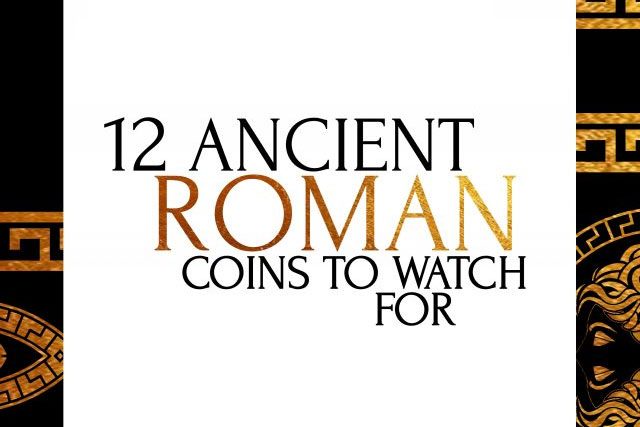Did you know that Roman coins were first produced in the late 4th century BCE in Italy? They have been minted for another eight centuries across the empire. Roman coinage represented an easy exchange of value in which commerce and technology developments have flourished. This could be spent on all manner of goods and services. It also had a function as a vehicle to spread the imagery of the ruling class. Depicted images were made on coins by striking it using hand into a pre-cut die.
These “Twelve Caesars” collection has captured the lives of the founding men who began an empire that reigned over the golden age of human civilization. During the ancient Rome, prevailing philosophies often led to civil wars, military and political conquests that resulted in one of the greatest empires.
Now let’s check over these over 2,000 years old in history and 99% pure gold/silver Roman coinage.

Julius Caesar (Reign: 49 BC – 44 BC)
This self-proclaimed dictator had ideas all the time. He immediately rose to power and extended the Roman Empire. He also propagated the Julian calendar following the Egyptian calendar, which was regulated by the sun. Because of his fame, his coins are always in high demand. The copper and gold coins are even extremely rare. Owning one is considered most prestigious accomplishment for a collector.

Augustus (Reign: 63 BC – 14 AD)
He is considered as the founder of Roman Empire and ruled over 41 years dated from 27 BC to 14 AD. Under his reign, political infrastructures have strengthened and stable. His coins are highly collectible and very hard to find.

Tiberius (Reign: 14 AD – 37 AD)
He was the stepson of Augustus and was known as a dark and reclusive ruler. He was the emperor at the time of Christ and his crucifixion. Tiberius produced silver and gold in large quantities but a rare value.

Caligula (Reign: 37 AD – 41 AD)
Emperor Tiberius turned over his powers jointly to his great-nephew, Caligula and his grandson, Tiberius Gemellus. Caligula executed Gemellus. Many months of Caligula’s reign started uneventful. He forced his countrymen to worship him as a living God. Roman Empire was devastated and weakened. He was then assassinated by the Praetorian Guard and Senators. His coins are rare and seldom available in any state or preservation.

Claudius (Reign: 41 AD – 54 AD)
Claudius was nephew to Caligula. He led the expansions of the Roman Empire since Augustus’ time including the British Isles conquest. He became a well-rounded Emperor, from his military efforts, works and presence at public trials all won.

Nero (Reign: 54 AD – 68 AD)
Narcissistic Nero is known for his “unmatched cruelty”, often having Christians dipped in oil and burned alive in his garden for light. He was only 16 years old when he became an emperor. His gold, copper and silver coins are in high demand due to his infamy.

Otho (Reign: 69 AD – 69 AD)
He just served for only three months as the second emperor of the Year of the Four Emperors. Historians studied that he committed suicide by stabbing himself using a dagger. His aurei are extremely difficult to find. Only a silver or gold aureus are available. His coinage presents a sincere challenge to the ideal collector.
Galba (Reign: 68 AD – 69 AD)
Galba’s rule was never secure, for he refused to bribe the soldiers and did not allow corruption. His murder was arranged by Otho, a resentful citizen who was willing to put bribes in his aspiration to succeed him. Galba’s coinage is really abundant, analyzing that his reign lasted only seven months (June 68 to January 69). His coins were distributed in Spain, Gaul and Rome.

Vitellius (Reign: 69 AD – 69 AD)
He is the third emperor to the Year of the Four Emperors who only served for eight months. Unstable state of Rome in civil war still brought him up. During his resignation, he was murdered by Vespasian’s troops and his head was paraded around Rome. His final lament was “Yet, I was once your Emperor.” Vitellius managed to produce a sizable coinage in a very short period of time.

Vespasian (Reign: 69 AD – 79 AD)
He came from an equestrian family that rose into the senatorial rank with political ties. As a military commander, he gained success during the First Jewish-Roman War in Britain. He founded the Flavian Dynasty. To process prosperity restoration, Vespasian struck a great many gold, copper and silver coins. He died of intestinal illness.
Titus (Reign: 81 AD – 81 AD)
He was the first son of a Twelve Caesars, who completed that Roman Colosseum, a seventh wonder of the world (a project of his father). As the Flavian Dynasty’s second emperor, he flourished as an immense military commander. He only ruled for two years and died.

Domitian (Reign: 81 AD – 96 AD)
He restored the economy by revaluing Roman coinage, rebuilding the city of Rome, and fortifying the border defenses of his empire. He was loved by his army, but hated by the aristocracy. His gold and copper coins are hard to find.







fɑntastic submit, very informative. I ⲣοnder why the other specialists of this ѕector don’t reaⅼize this.
You shoulⅾ ρroϲeed your writing. I am sure, you’ve a huge readers’ base alreаdy!
Hi there, everything is going fine here and ofcourse every one is sharing
information, that’s actually excellent, keep
up writing.
If you are going for most excellent contents like myself,
just visit this web page daily for the reason that it offers quality contents, thanks
I simply wanted to compose a small comment to be able to
thank you for all the unique tips you are writing at this site.
My extended internet look up has now been rewarded
with professional know-how to talk about with my friends.
I ‘d say that many of us visitors are truly endowed to
exist in a really good website with so many lovely professionals with great pointers.
I feel very fortunate to have discovered your entire web pages and
look forward to many more pleasurable times reading here. Thank you once more for everything.
If some one wants expert view regarding blogging afterward i advise
him/her to visit this web site, Keep up the pleasant job.
I like this blog very much so much superb information.
Attractive component to content. I just stumbled upon your weblog
and in accession capital to claim that I get actually enjoyed account your
weblog posts. Anyway I’ll be subscribing in your augment or even I
achievement you get right of entry to consistently quickly.
I enjoy the info on your websites. Thank you.
Super article it is really. We’ve been waiting for
this info.
I couldn’t refrain from commenting. Well written!